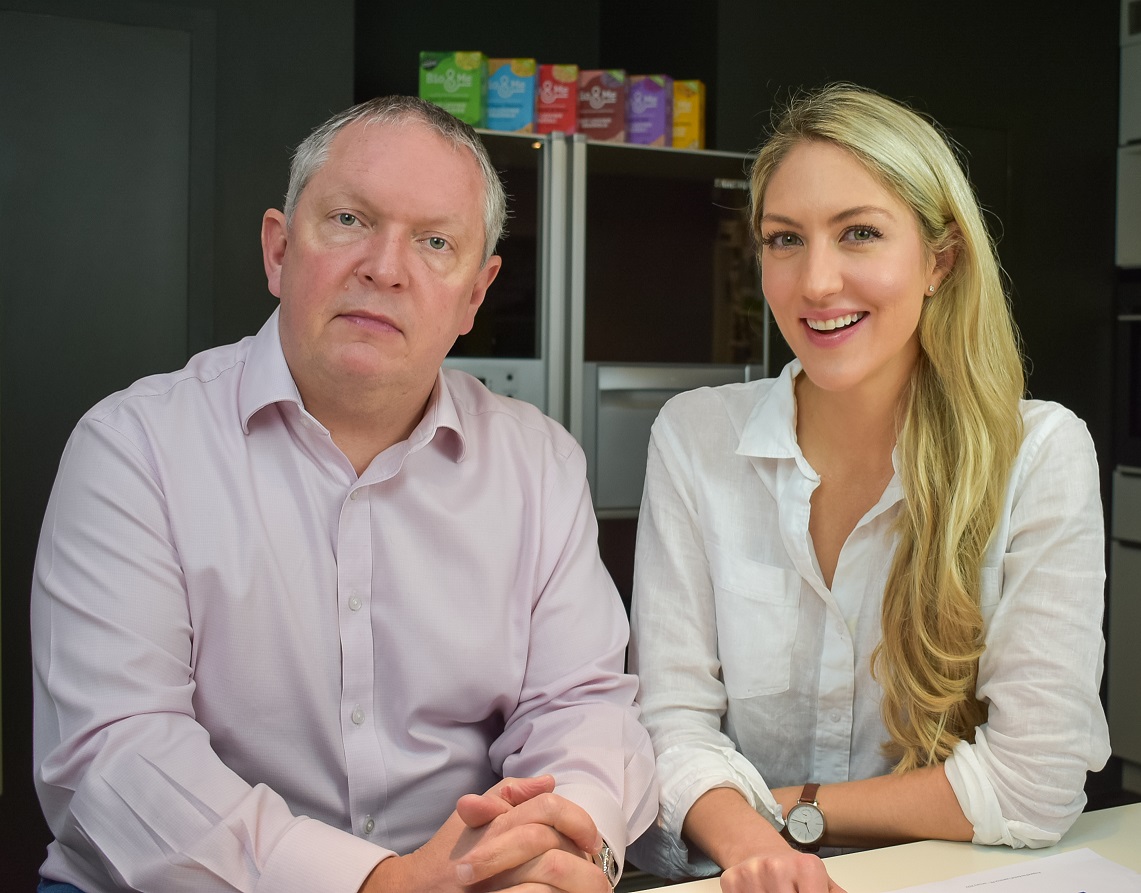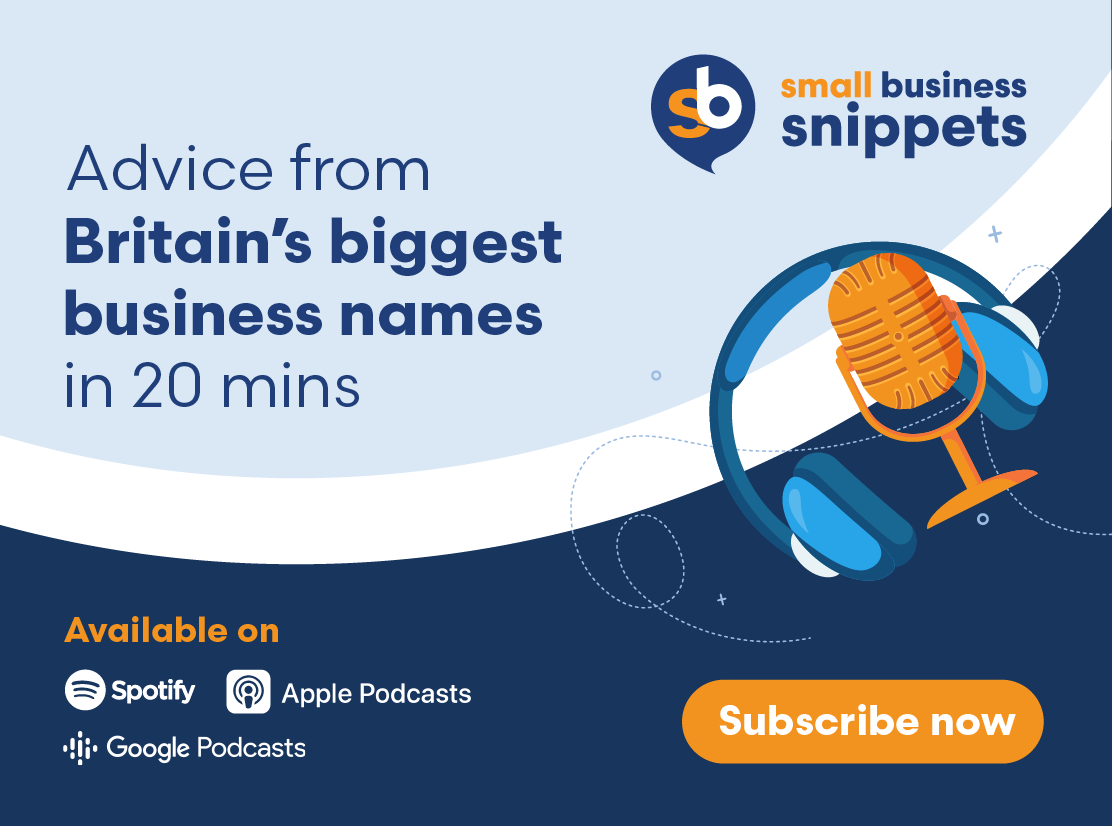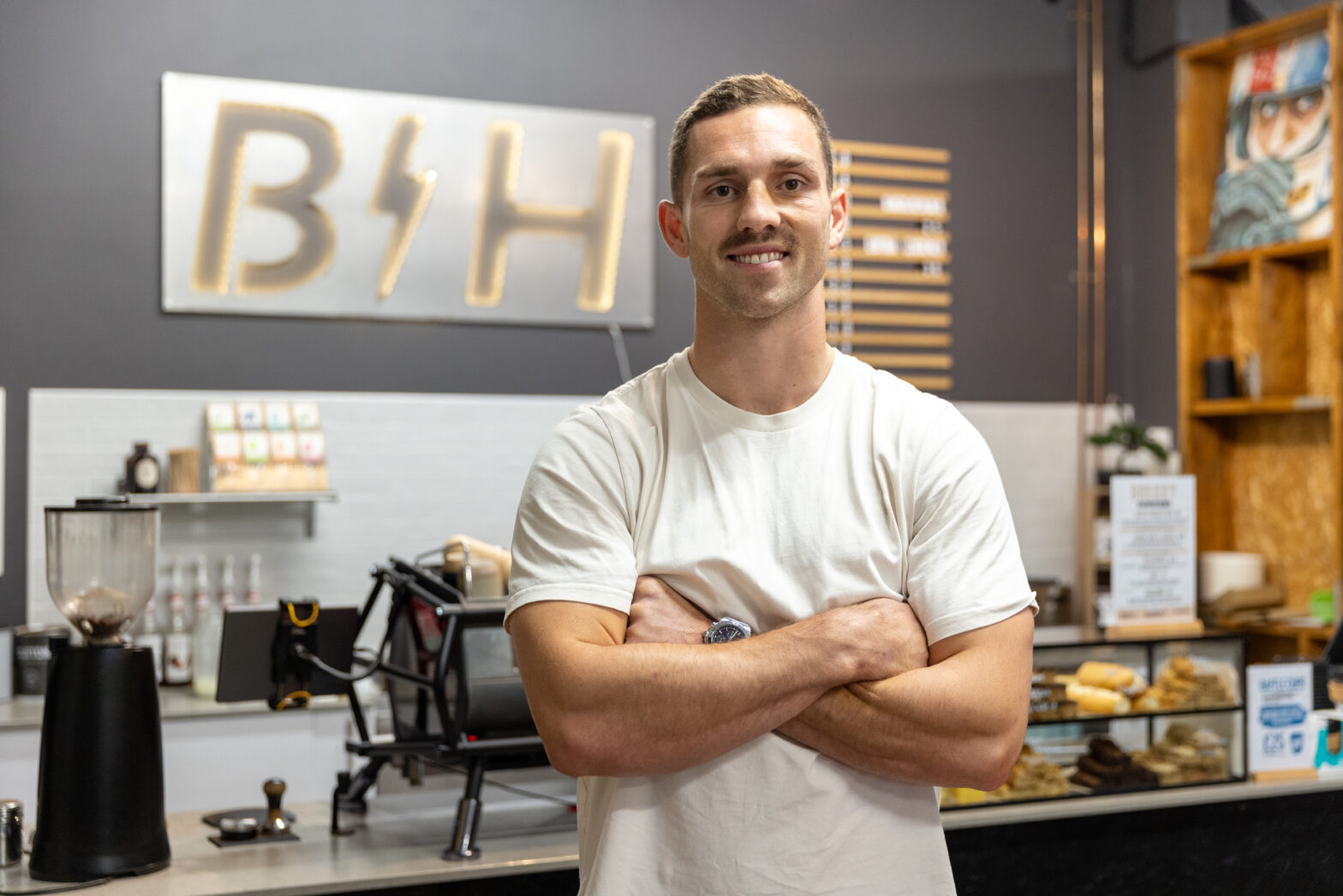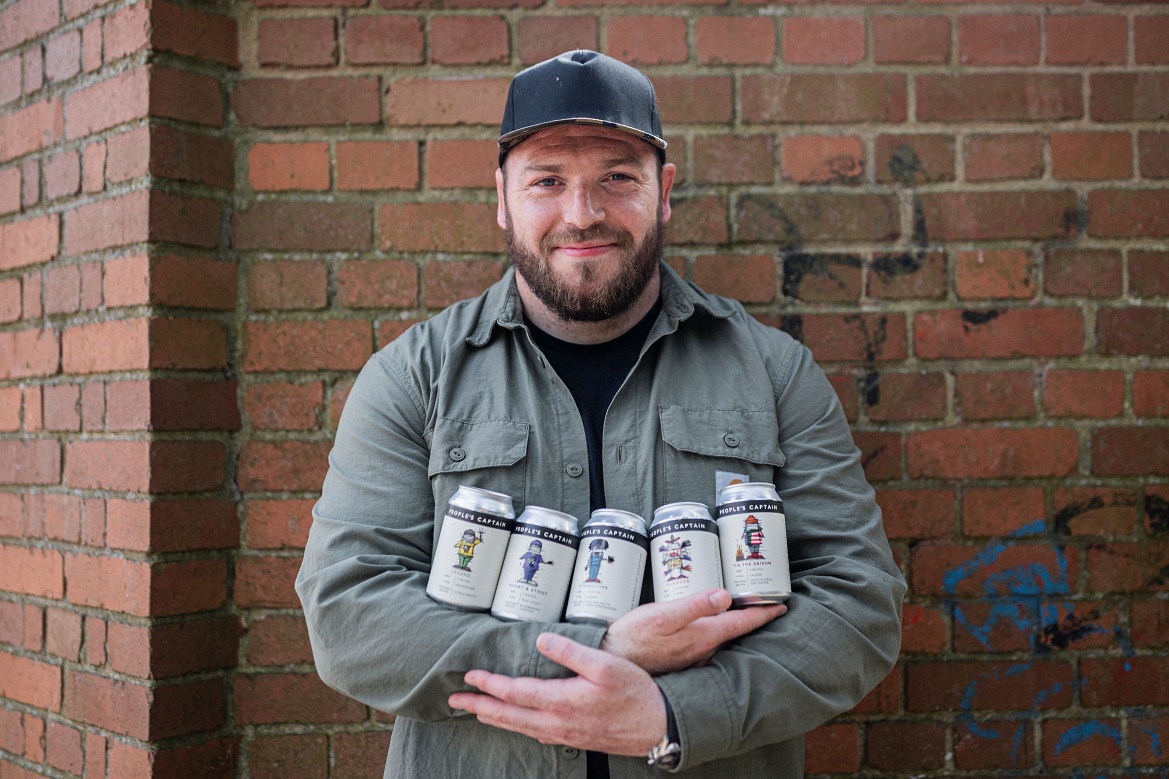Welcome to Small Business Snippets, the podcast from SmallBusiness.co.uk. Today’s guests are Dr Megan Rossi (aka The Gut Health Doctor) and Jon Walsh, founders of Bio&Me granola and yoghurts.
We’ll be discussing how to win over buyers and create memorable social media content.
Listen to it in the media player below.
Or watch this teaser video.
You can also catch our episodes with:
- Entrepreneur, author, investor and podcaster, Grace Beverley
- Entrepreneur and star of SAS: Who Dares Wins, Ollie Ollerton
- Business owner and former pro footballer, Thomas Hal Robson-Kanu
- Myleene Klass and Jamie Barber, founders of My Supper Hero
- Pub owner and winner of The Great British Bake Off, Candice Brown
- Entrepreneur and former athlete, Sally Gunnell
- Entrepreneur and The Apprentice winner, Sian Gabbidon
- Abel & Cole founder and chairman of Freddie’s Flowers, Keith Abel
- Entrepreneur and The Apprentice 2019 winner, Carina Lepore
- Dragon Tej Lalvani and entrepreneur Sam Jones
- Angel investor, entrepreneur and TV personality, Spencer Matthews
- Entrepreneur and former Dragon on Dragon’s Den Ireland, Lady Chanelle McCoy
- Businessman and The Apprentice winner, Mark Wright
- Entrepreneur and campaigner, Paul Lindley
- Managing director of Brompton Bikes, Will Butler-Adams
- Businessman and author, Gerald Ratner
- Entrepreneur and TV presenter, Trinny Woodall
- Pub owner and bartender on Channel 4’s First Dates, Merlin Griffiths
- Founder and chairman of Pimlico (formerly Pimlico Plumbers), Charlie Mullins
- Retail expert and former Dragon, Theo Paphitis
- Author and boardroom expert, John Tusa
- Digital guru and investor, Sherry Coutu
- Entrepreneur and former Dragon, Rachel Elnaugh
- Businesswoman and Dragon, Deborah Meaden
- Entrepreneur and The Apprentice 2005 candidate, Tim Campbell
- Gousto CEO, Timo Boldt
- Entrepreneur and The Apprentice 2018 candidate, Jackie Fast
- Investor and former Dragon, Piers Linney
- Investment fund manager, Nicola Horlick
- Supermodel turned entrepreneur, Caprice
We’ve got podcast episodes from the first series looking at:
- How one business owner’s mental breakdown caused her to see trolls from her past
- How one entrepreneur hired a videographer to track their every move and build their business brand
- How funding a business led one entrepreneur to stress-related alopecia
- One entrepreneur’s first professional public speaking engagement
- Adapting to UK life and learning English before starting a business
- Securing seed funding
- Finding the perfect head of customer care
- Reaching a £1 million annual rate of return
- Boosting client numbers from 30 to 850
- Starting a brand new business from scratch
To find out more about Small Business Snippets, you can download the trailer.
If you want to listen to the podcast elsewhere, it’s available on Apple Podcasts, Google Podcasts and Spotify. Watch the new video versions and subscribe over at our YouTube channel. It’d also be great if you could leave us a review.
Remember to like us on Facebook @SmallBusinessExperts and follow us on Twitter @smallbusinessuk, all lower case.
Megan Rossi (The Gut Health Doctor) and Jon Walsh podcast transcript
Hello and welcome to Small Business Snippets, the podcast from SmallBusiness.co.uk. I’m your host, Anna Jordan.
Our guests for this episode are Dr Megan Rossi and Jon Walsh, founders of gut-friendly food brand, Bio&Me, launched in 2019. Their latest funding round closed £1.6m back in March 2022 and they’ve landed a recent investment from England captain, Harry Kane.
Megan aka The Gut Health Doctor is a dietitian and research associate at King’s College London and a regular on This Morning. She’s released two books and founded the Gut Health Clinic in London.
Jon has had a career spanning over 30 years in the commercial and marketing space, including roles at P&G and John West and a seat on the UK board of Nestle.
We’ll be talking about making memorable social media content.
Anna: Hi, guys, how you doing?
Megan and Jon: Hello! Yeah – really good, thanks.
Smashing. Well, I’ll get straight into it. As mentioned in the intro, you guys are the founders of Bio&Me. What’s the biggest challenge you had in starting the company?
Megan: For me, it’s really designing the products and making sure that every element of it is very much in line with the science. So as a background, I’m a scientist, and I wanted to make sure that all of my research and my beliefs on what’s really going to help people with their gut health is really emulated in this in this product. For me, there was a lot of pressure on getting the product right. It’s not just that, I guess, the science, but I wanted to make sure it tasted delicious. Because, as a dietitian, I know that even if something is really healthy for you, if it doesn’t taste good, people aren’t going to be repeat buyers. For me, it was getting that right formulation of the products.
Jon: Megan is spot on about the product. That was the number one thing to get right. I suppose the other thing that surprised me how it worked, like all those nice big companies you just mentioned in the intro, when you make a promise to retailers that like 100 per cent customer service, I just really hadn’t realised quite how much goes into making that happen. So many details. They really do matter. I remember at one point, before Covid, there was a shortage of cardboard in the world. I just couldn’t believe that, we’ve got the product, right, we’ve got the branding, right, but somehow, brown cardboard for outers was going to be the problem. There are just so many devils in the detail, you’ve just got to get it right. At age 48 that was a huge learning for me.
Especially for yourself, Jon, what were the challenges in getting Bio&Me on the shelves compared to other products that you’ve worked with before?
Jon: Um, so this is just going to make me sound like I’m flattering my co-founder, but what the big advantage that we had is that we have a USP, a unique positioning. We are the best for gut health, which is what, Megan, by designing the products we were just talking about, does. The retailers are really busy all the buyers. One cereal buyer was telling me that she was getting sent three or four new granolas a week. In order to stand out, you’ve really got to have that unique positioning. That’s what Megan brings to Bio&Me, which is, I think, our greatest strength. The other thought on it, I suppose, is I think there are some people out there who think that you just send one email, you’ve got your USP, everybody will realise it and think it’s fantastic and on you go.
Actually, you’ve just got to be charmingly persistent, you just got to keep going with very good humour, until you find the right moment. In truth, we’re a small start-up, we’re not the most important thing in most retailers’ lives. You’ve got to have a bit of humility and understand where you fit in the grand scheme of things, and then just be ready to grab your moment when it comes.
As we’re speaking in more practical terms, what does that look like? Does it start with an email, maybe a follow-up a week later, building a relationship that way?
Jon: It really depends. I mean, if you can possibly find a warm introduction, so somebody who knows the buyer. If our strategy is quite obvious, you know, Megan has designed the products and knows how to make them best for gut health. I’ve got grey hair, so I worked in food for 20 years or so. So, although I you know, far from it, and you knew all the buyers, I probably only knew one but I might know somebody who knew somebody. So, if you can get a warm introduction, I would definitely recommend that. Emails can work but do prepare to be persistent. I saw one new wine brand who was on LinkedIn talking about the fact that they emailed the same buyer 200 times over a two-year period. That sounds like quite a lot of emails to me. So I think you’ve got to try and find your way to doing it in a way where you’re standing out but in a chillin one of the right way but you’re trying to be the fun part of the buyers job, not a hassle for them.
“One new wine brand emailed the same buyer 200 times over a two-year period”
Jon
Megan: Just to confirm that Jon and I don’t often give each other compliments or we like to flatter each other. Very rare for us. But to add, I think that is certainly one of Jon’s strengths in terms of just really being a people person, and being empathetic, but also being quite charming and how he can get in the inner circle and work with them. So I think that is a definite skill that Jon’s developed. Maybe it’s the ex-Nestle of 10 or so years and all the things you learned there, but you certainly have a way with people, I would say.
Jon: Developed it late in life, maybe.
Megan, you have a real huge social media presence. Talk to me about breaking down scientific concepts, which are potentially quite complicated. You need a lot of time to really digest them – for want of a better word!
How do you make social media posts about a complex subject memorable?
Megan: For me, it’s just thinking about how you would talk to your girlfriends who might not have a science degree. What would grab their interest? What would motivate them to make some key changes in their life to support their gut health? That’s one of the key things. Whenever I’m writing a post, I think, well, how can I grab the attention of my girlfriends? I feel like that is a way that I seem to be able to get some of those key messages, but certainly isn’t something I always get right.
As a scientist, I want to always load the scientific information in there because I find it so exciting. But I need to realise that maybe not everyone appreciates the power and the potential of our gut microbiome, being fed that on a daily basis. Think of new angles to entice people.
When you were launching Bio&Me, I understand that you chose to go straight to market and do your own thing. Talk to us about that and how that came about.
Megan: Do you mean, me working with other companies? It would be potentially that, you know, there were some of the big guys who I thought I had a great opportunity to work together with when they approached me about being the face of their gut health range. But sadly, when it came into understanding what I was able to change in the products, sadly, it was very limited and their products just weren’t in line with the research around what’s good for your gut health. So that’s when I knew I had to go out and do it myself if I was ever going to get into food industry.
Why were they resistant to making those changes?
Megan: It’s a tricky one. I think a lot of it came down to their price challenges. And they were of the belief that the changes that I wanted to make to some of the recipes would have cost them too much in their margin and they wouldn’t have had a financially viable product. It motivated me more to be able to show them that, actually, you can have a product that is absolutely good for the gut and is a profitable business as well.
Now, of course, that’s not something I knew how to do. But I knew that I could find someone who had all those businesses skills, then be able to make sure that it was going to deliver that way. And that’s when I headhunted Jon, he has a different story. But we met in the middle, and we’d work together on another project. I just remember, again, I don’t like to give him any compliments, I’m going to have to pop his head at some stage in this podcast. But, you know, he did have all of those business skills that I knew I needed, and that I didn’t have, to have a viable business. So yeah, I think it really came down to that. And that’s why I am so incredibly proud of everything Bio&Me has achieved, because we’ve done good gut health the right way, but still being able to be a profitable business.
With recent challenges, namely, in the form of the cost of living crisis, how has that affected Bio&Me, if at all?
Jon: If we use the lucky word, we’ve been lucky, so far, in a sense of we’ve been growing very fast. As we’ve grown it, our volumes increase, therefore, we can buy our ingredients at ever cheaper prices, because of the volume discounts we can now get. Megan’s obviously designed the recipes to be the very best for gut health. That does imply that there’s a premium on the ingredients to make sure they’re the right ones. But as we grow, we can obviously buy them cheaper, therefore, so far, we’ve been able to offset inflation.
There’s also a sort of a happy coincidence for us where, when you were talking about product development earlier, you know, we launched in 2019, and then you get lots of feedback from consumers, they tell you what they love, the bits of the flavours they love. They also tell you some things they don’t like. So occasionally, we were getting comments about hardness and taking out the some of the hardness in the product. When we analysed it, that happened to translate to some of the hardest, most expensive ingredients as well, some of the nuts and seeds, etc. We were able to swap those out for softer ingredients, which also helped on the cost, which meant we haven’t had to put a cost increase through at all yet.
Anna: That’s the importance of customer feedback as well.
Jon: Yeah. And this time, we were just very lucky that the where the customers are asking us to go and we’re only talking tiny tweaks. In our fundamental principles of being the best for gut health, we’d never compromise on the taste and flavour side. You mean you listen to your consumers. That’s why, we’re mainly a retail business obviously, we’ve got our lovely partners Tesco, Sainsbury’s, Waitrose, ASDA, Ocado, etc. But our ecommerce business is wonderful for getting customer feedback. Because they buy from you, they email you. We get lovely emails every day, we get, you know, three, four or five emails from people asking us questions, telling us what they like, occasionally wanting changes. That’s gold dust for us.
Megan: I think that’s also where the social media community comes into play. We’re looking at NPD (new product development). And we’ve got about 20 different products and put it to them. They’re so passionate about it give us really detailed feedback. So it’s brilliant to have that community on side as well.
How are you managing your growth plans without overexpansion and the risks that come with that?
Jon: So I saw a number one focus, by the way, I’m not sure if this is in your question, but is the UK. We quite often get asked about going international right now. We just want to make sure we get absolutely everything right in the UK, on our cereals and on our yoghurts. We’re obviously in two categories, and in truth that is more than enough to be getting on with. If you imagine our ambition is to have our granolas, our pouches and yoghurts in all the supermarkets, and in as many stores as possible in those supermarkets, there’s an awful lot of work for us to do still to do that. We’ve had a great start. We’ve had a great year with a lot of new launches but the truth about a launch with a supermarket is that’s just the start of the hard work, then you got to get a good rate of sale and grow your business with the supermarkets that you’re in so that’s kind of our number one focus. If we get that right next year [2023], I mean, what’s lovely is our business has doubled this year, we just get the distribution we’ve got right. Next year, we’ll double again. That is our absolute number one focus.
Megan: I think to add to that is Jon is very tight with money, which is actually a really beneficial thing.
Jon: Three compliments!
Megan: Is that a compliment? Maybe a backhanded compliment. So I think, again, our growth, the doubling has been done on quite a small marketing budget. We’re very cautious with how we spend the investment that we’ve gotten. And, again, it shows that, if we didn’t throw money at the marketing, like many other companies do, I think our growth could be even more accelerated, but we want to be obviously very savvy, going into some pretty difficult times. Some are quite cautious with that, but still have obviously been achieving pretty good growth.
What kind of areas of marketing do you focus on for the greatest results?
Jon: I used to read a lot about social media. That is a big, big, big focus for us, partly from a brand awareness point of view. But also, that engagement piece that Megan was chatting about is so important, the relationships. You can build up there, then we spend as much money as we can, as close to the point of sale as we can, whether that’s ecommerce on our site or with our retail partners. What we want to do is try and grab people’s attention, when they’re literally in stores or on retailers’ websites, because, you know, we don’t have the millions to do TV advertising campaigns that the big companies like Nestle can do. We have to find ways to grab people’s attention.
Our best marketing really is our packaging and if we can just add our product and if we can get our packaging and our product into people’s hands, they can read Dr. Megan’s story on the pack, they can try the product and that’s what converts people to us. So yeah, that’s where our real focus is.
Megan: And I just think with the power of social media, the word of mouth, that free marketing, I think, again, that’s how we’ve been able to keep our marketing budget down is kind of utilising the community we’ve already got available to us. They really do believe in the Bio&Me brand and really support it. So, I think that’s helped a lot as well.
I just want to round off with a question for you, Megan. You’re still of course, working in science, but are also an entrepreneur. How has that gone down with the medical community?
Megan: You know, I love that people ask me this. And I think everyone’s responded really positively, I think because I still work as a research fellow at King’s so I haven’t ‘sold out’, so to speak, I’m still ensuring that the products that we are developing are in line with the science. And I think that is something that my colleagues are really proud that I’ve continued to do. If I ever change that, I think I would cop a lot of flack. So I think they’ve been really positive and have loved being able to recommend the product to a lot of their clients in terms of, you know, my nutrition and dietetic colleagues, because they also saw that there was no product out there that, you know, was actually claimed namely good for the gut in terms of the no added sugar, the prebiotic claim that we’ve got and that plant diversity delivering the 15+ plants and each and every product so, they say they’re the experts, they see the product and they’re like, ‘Wow, this is actually really impressive’. And yeah, so I think overall it’s been really positive so far. Knock on wood.
Anna: Well, that’s it for me unless either of you have anything you’d like to add.
Jon: Nope! I quite enjoy these things.
Anna: Yeah, it’s nice to have a chat! Thank you both so much for coming on.
Megan: Absolute pleasure. Thanks for having us.
You can find out more about Bio&Me at bioandme.co.uk and Megan at instagram.com/theguthealthdoctor. You can also visit SmallBusiness.co.uk for more on starting your own business. Remember to like us on Facebook @SmallBusinessExperts, follow us on Twitter @smallbusinessuk (all lowercase) and subscribe to our YouTube channel, linked in the description. Until next time, thank you for listening.




